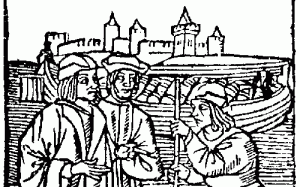Views of hosts: reporting the alien commodity trade, 1440-45

The 'Views of hosts' were a series of English government records produced in response to a statute of 1439 which required that money made by non-English merchants from sales of imports must be entirely expended on English goods for export, thus preventing the country's wealth draining away in specie and bullion. The Statute compelled these merchants, known as 'aliens', to make full disclosure of their daily business activities to English hosts, who returned the information to the Exchequer. There are 70 surviving returns covering both itinerant and resident traders, each engaged in varying numbers of transactions, together with the names of all their business contacts and the details and prices of goods they traded. Sometimes their commercial costs and living expenses were also included. Their imports covered a wide variety of prestigious goods - spices, nuts and sugar, sweet wines, fabrics, jewels and furs - as well as practical items such as fish for consumption during periods of abstinence, raw materials for industrial use and military hardware. Their purchases for export feature many different types of English cloth, wool, tin, pewterware, and other small manufactures. They exhibited a wide divergence in trading practice. Some were engaged at subsistence level, with a few transactions that barely covered their costs, while others acted as representatives of multinational companies with huge turnovers and considerable capital at their disposal.
During the 15th century, the English governing authorities operated a system of socio-economic exclusion and control based upon neither race nor ethnicity, but upon political allegiance to the English crown. Central legislation specifically targeted aliens for economic restriction and differential taxation, and local avenues of advancement to which they had previously had free access were suddenly barred to them. Aliens found themselves progressively excluded both from municipal politics and from the urban socio-economic networks essential to the survival of medieval businesses. A deliberate policy of alien exclusion and control, given a theoretical basis in contemporary economic thought and openly practised by the upper strata of government and society, spawned further specific complaints and abuse against aliens at lower levels.
The government data collected about the alien community during 1440-45 has been made available by the project in three different formats, to suit the requirements and abilities of the broadest possible user base: a transcript made from the Anglo-Norman and Latin originals, together with a database derived from the information contained, both of which are available on-line. It will further provide a modern English translation prefaced by an analysis of the social, political, economic and legislative context, for publication by the London Record Society (forthcoming 2010).
Publication
Transcriptions (in Latin and Anglo-Norman) of the 74 surviving Views of Hosts for London, Southampton and Hull with modern English preamble (pdf format, deposited in SAS-Space e-repository, December 2006); Database of 2300 transactions (Access format, deposited in SAS-Space e-repository, December 2006)
Reports
CMH Annual Reports 2003–4, 2004-5, 2005-6; End of Award Report
Project details
Researcher: Helen Bradley, BSc. Soc. Sci., B.A., Ph.D.
Funded by: ESRC (Ref: RES-000-22-0628) (1 April 2004-30 September 2005)
Amount Awarded: £36,645
